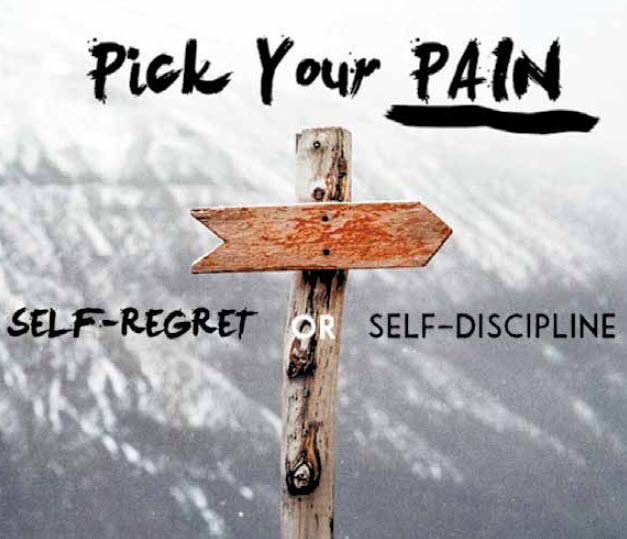Our lives are full of choices, and with every decision we make, we must understand there comes a cost. Two forms of pain oftentimes define the outcomes of these decisions: the pain of regret and the pain of discipline. The pain of regret is the sorrow we feel when we look back at missed opportunities that we should have taken, neglected responsibilities that should have been met, or just overall poor decisions. This pain of regret lingers and is typically accompanied by a sense of loss and frustration over what might have been. On the other hand, the pain of discipline is the discomfort we endure in a particular moment when we make sacrifices, keep consistently showing up, and push through challenges to achieve our goals.
While both forms of pain are inevitable, their timing and impact are the main differences. The pain of discipline is temporary and yields rewards, whereas the pain of regret lasts far longer, often coming with consequences that negatively impact our lives. The choice is ours to make whether it is enduring the effort today or facing the regret tomorrow. Either way – one sense of pain will be felt.
For example, a 45-year-old professional always dreamed of starting a business but kept procrastinating due to fear of failure and the comfort of a steady paycheck. Flash forward many years, and this person finds themself stuck in a job they dislike, regretting never having taken the chance to follow their dreams and passion.
Another 45-year-old decides to start their business despite the challenges. They sacrifice evenings and weekends for years to build their company, enduring stress and hard work. Over time, their business becomes successful, and they achieve financial freedom and personal fulfillment.
In both cases, effort and sacrifice are involved – but one leads to lasting regret, while the other leads to long-term satisfaction. Too many people are walking around waiting for success to happen to them when the reality is they need to be prepared to create success. Someone once said success isn’t given; it’s earned with hard work, determination, and a relentless focus on your goals. Every step you take today builds the foundation for the greatness you’ll achieve tomorrow.
To master the pain of discipline, I believe some actionable steps must be taken to cultivate discipline in your life. For example, the ability to set clear and specific goals, create a plan and schedule to stick to, eliminate distractions, and learn how to embrace failures as lessons.
When it comes to setting clear and specific goals, we need to learn to define exactly what we want to achieve. Too many people are walking around without a clear and concise picture of what they want to achieve. We need to define who we want to become, and it takes breaking big goals into smaller, manageable milestones. For example, instead of saying, “I want to get fit,” set a goal like, “I will work out 3 times a week for 30 minutes.”
In creating a plan and schedule, it is important to write down actionable steps to reach goals and utilize resources such as a calendar or planner to allocate time for these steps. An example would be scheduling daily time for focused work or practice.
Another struggle for many people is learning how to eliminate distractions. It begins by identifying what disrupts your focus (i.e., social media, clutter, noise) and learning how to minimize them. For example, put your phone on silent or in another room during work sessions. Instead, what happens is we hear the notification go off, and before we know it, we are distracted by technology.
When it comes to life, we need to embrace “failures” and use them as learning lessons. Too often we take losses and dwell on the negative, but we need to take our “losses” and learn from them. We need to accept that setbacks are part of the process – reflect, adjust, and keep going. We cannot give up and quit which seems to be the case for many people. For example, if you miss a workout or deadline, restart the next day without guilt.
Consistency is key – discipline strengthens with practice and leads to long-term success. We will all face some kind of pain in our lives — the pain of regret or the pain of discipline — but ultimately the choice is ours to make. For this article, I want people to learn how to live life disciplined and not look back at the end of life with regrets.
By: D. A. Slinkard
D.A. Slinkard would love your feedback. You can contact him at da.slinkard@gmail.com







